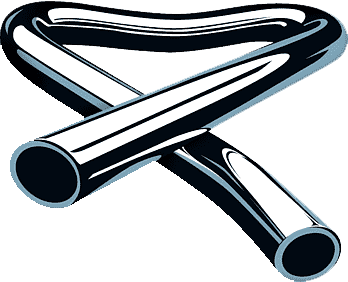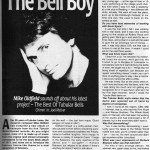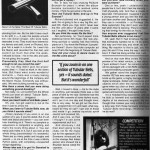Intervista a Record Collector
The Bell Boy
Record Collector – July, 2001
Mike Oldfield sounds off about his latest project – The Best of Tubular Bells
Chimin’ in: Joel McIver
- Pag 1
- Pag 2
After 28 years of tubular tunes, the maverick composer Mike Oldfield has compiled a new album of excerpts from his five Tubular Bells- themed records. As you might expect, most of it is made up of music from the original (and almost universally considered to be the best) Bells album of 1973, and looks set to introduce the famous trance-like theme to a new generation of listeners.
Record Collector visited Oldfield at the studio complex of his Buckinghamshire home and invited him to spill the beans about those far-off sessions. It’s an impressive place, with banks of equipment and computers humming quietly in corners, but with the eccentric’s mark stamped firmly on it (there’s a Things Wrong In Studio list on the wall- the last item reads “Giant penguin on loose in attic”).
Oldfield himself is a softly-spoken man who pauses to think before answering questions and occasionally explodes into throaty, tobacco-fuelled laughter. He’s happy to discuss a variety of subjects (havin’ it large in the Balearics, the early rejection of his demos and- aarrgghh!- Richard Branson) but refuses to be drawn if there’s anything he doesn’t want to talk about.
An interview not to be approached lightly, then- but as it’s his 48th birthday and his record company representative has just presented him with a rather tasty bottle of red wine, he’s on good form. However, he is politely bemused when I ask him what he thinks of The Fast Show’s adoption of Moonlight Shadow as the theme to its ridiculous character, Dave Angel: Eco Warrior. Perhaps just as well…
Q: You were a child prodigy, weren’t you?
A: Well, I was certainly playing in public at a very young age- at the age of nine or 10 I was performing at the village youth club. And when I was 13 I had a residency at a folk club in Reading- two different folk clubs, actually. We went all over the place, even up to the Edinburgh Festival, in our little folk duo. We used to busk on the streets as well.
Q: Do you have fond memories of working with Kevin Ayers?
A: It was the first time I felt I was working with a real band, and it was very exciting going to the studio at Abbey Road and getting paid. We’d go in and work for two or three days, and a man in a suit and tie used to give me an envelope full of money- well, it was only about £20, but that was a fortune to me at the time. It meant I could eat for the next three weeks.
Q: What was Kevin Ayers like?
A: I liked hims a lot. He became my mentor. He loved his alcohol: we’d get into the Transit to go to Bingley or Lancaster or somewhere and he’d start drinking his bottle of wine. He taught me a lot- things like not being afraid of repetition: just because you repeat something doesn’t mean you can’t think of anything else to play. Like a mantra, it becomes trance-like after a while.
He was lovely. But as the years went oon, I put more and more into the band, until I felt I was doing too much and not getting any recognition for it. It was Kevin who lent me my first tape recorder, which I made the Tubular Bells demo on.
Q: The Tubular Bells myth states that the demo was rejected out of hand by dozens of companies.
A: I took it round all the majors: CBS, EMI- Harvest, that is, who had the Pink Floyd- and Warner Brothers. The Whole World were on Harvest, who had seen me working in the studio and had expressed a bit of interest, but in the event they didn’t want it.
Q: Was that demoralising?
A: Yes, it was terribly demoralising. I eventually gave the tapes to the Whole World roadie and said, you’re a better talker than I am- you try. He went around and didn’t get anywhere either (chuckles).
Q: What was your impression of Richard Branson when you first met him?
A: He was a very strange person. He seemed very upper-class to me, and looked like he had millions- although I know he didn’t. He had a great big Bentley, which I finally got off him when I agreed to do the first Tubular Bells concert. And once I got it, I realised it was falling to pieces.
Q: Did you find him agreeable as a person?
A: No (pauses to think). He didn’t really like me much. He was a such a different social standing from me. But he didn’t have much to do with it. It was the people around him, like Simon Draper, who were really interested in me. They must have listened to my demos and said, come on, Richard, let’s give him a week in a studio. So I went into the Manor and recorded the first half, and loved it so much that after the wekk I refused to leave. I hid in the attic and said, I’m not going, this is great.
Q: Presumably they liked the first half enough to let you record the rest?
A: Yes, but they didn’t give me the proper studio time- I had to work in the down time. But there were some wonderful moments- there was a lovely feeling around the beginnings of the company and the Manor House. Everybody was enthusiastic. We were building something new.
Q: Was there a sense that you were doing something ground-breaking?
A: Not really, no. Lol Coxhill from the Whole World just went on about Tubular Balls, Tubercular Balls (sniggers).
Q: Have you heard loads of anti-Bells jokes?
A: Oh, yes. I’ve got used to it, but at the time it used to annoy me.
Q: When you listen to Tubular Bells now, do you think it sounds dated?
A: (thinks carefully) If you zoom in on one section of it, yes, it sounds dated. But it’s all flesh and blood and sweat- you can even hear breathing on it. There’s no samplers or sequencers or computers or anything, and that’s the lovely thing about it. You can easily pick holes in it, but if you look at the whole thing (passionately) it’s wonderful. There are so many peaks and troughs and spaces- to me at the time it was a Monty Python piece, with completely unexpected things happening.
Q: Whose idea was it to get Viv Stanshall to introduce the instruments?
A: Mine. Simply because they (Bonzo Dog Doo Dah Band) were the band booked in the next day. They were watching TV and drinking in the house while I was working frantically. There was a track on a Bonzo Dog album where he did introductions, and I thought, wouldn’t it be great if he said what was coming in? One of the engineers went and asked him and he came in with his bottle- he was a little bit worse for wear by that time. And he did it in 10 minutes.
Q: Did he get a royalty?
A: No. In fact, he was chasing Richard Branson for years- when the album became successful he wanted some money. I think he got some in the end.
Q: How did Tubular Bells end up in The Exorcist?
A: Richard phoned and suggested it. He said, this is going to be a very big film, so I said OK, thank you, bye. And I never saw the film until about 15 years after it came out. I laughed, I thought it was funny.
Q: Do you think the music fits the film?
A: Not particularly, no. You’d expect more traditional horror-film music. But now anything spiritual or spooky has that tinkling piano on it. You know the Pentium 3 processor theme? (hums four-note computer ad tune) That’s the beginning of Tubular Bells.
Q: How did your move to dance music in the 90s come about?
A: Well, I moved to Ibiza- not for the clubs or anything, just because there was a nice piece of land by the sea. Someone had this crappy little cassette of some techno music, and I put it on one day and thought hmm, this is very easy. So we got out the drum-box, programmed it in and said, what keyboard do they all use? I got one of those and made it go…(makes squelchy synth sound) and pressed Go. And it was nice, so then I thought I’d add some experimental stuff to it.
And obviously I did then start going to the clubs, not for the music but for the spectacle of it. Someone introduced me to this strange Red Indian person who showed me a Brazillian dance called the capoeira.
Q: It’s also a martial art, isn’t it?
A: Yes. He taught it to me on the beach. I was talking to my psychotherapist about this- I think it’s the adolescence I never had. Because I came straight from school onto the road, then it was studios, Virgin, Tubular Bells- my God. I never had any fun in those days. I spent half my life sitting in a Transit running up and down motoways.
Q: Did you ever take Ecstasy when you were out there?
A: One or two, yeah. I understand why people like it, but I didn’t feel like dancing- I felt physically sick. And then a couple of days later I felt paranoid. I suppose if you’re a young person and you feel like that, you just have another one! Because the energy they use is is incredible- at Privilege (the Ibiza superclub), they don’t even use their feet when they’re dancing. They’re conserving their energy for the next six hours.
Q: Has anyone ever suggested that five Tubular Bells albums is too many?
A: Oh, yeah. But if I had to behave the way that everybody wanted me to, I’d be going this way and that way and never do anything. My reaction to that is just, you live your life and I’ll live mine the way I want to live it. If I feel like doing another one, I will.
And on that note Mike invites RC for a preview of his latest venture, a new album (“pure ambient music” he remarks) which will be packaged with a CD-ROM containing a ground-breaking computer game.
We gather round the largest computer monitor RC has ever seen and a technician boots up the game, a mighty barrage of fluid digital landscape, dotted with creatures and objects which alter the narrative of the game when you click on them, and which is accompanied by a classic Oldfield searing-guitars-and-swooshy-soundscapes theme.
It’s a headspinning experience, and as he bids us farewell and vanishes into the depths of his electronic kingdom, the last thought that crosses you mind is that it’s all a long way from those famously analogue Tubular Bells recordings. Whatever will he do next?








